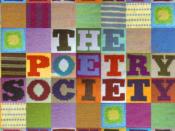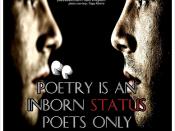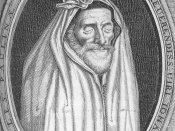The seventeenth century was known as the Age of Revolution. In this time of social change, an atmosphere of conflict is notable in the literature during this period.
The writings of John Donne reflect this conflict, reflecting a view of love that was never seen before from poets before his time. He uses his intellect to implement what is being said in his poetry; including his wit, and the wisdom he has obtained from being in love various times. When Donne wrote the Triple Fool, he recognized the fact that love is foolish, and when writing about it causes others to be foolish themselves.
Instead of following any particular rhyming scheme, Donne places more emphasis on the speaker's cowardice. The speaker already knows that he is not the most admirable person in the world, he states this immediately in the first line, "I am two fools, I know."ÃÂ He constantly uses such words as, if, thought and should, to prove the speaker has not taken any action in changing the situation that he is in.
But, Donne does use alliteration to emphasize the speaker's shyness when talking to women.
"But where's that wiseman, that would not be I, If she would not deny?"ÃÂ (Lines 4-5) Here, the w-sound is repeated, and later on in the poem, lines 13-14 the constant s-sound is used to show the spite he feels when others red his poetry.
Donne uses his cleverness to emphasize the speaker's past experiences and the wisdom he has obtained from it.
"Then as th' earth's inward narrow crooked lanes Do purge sea water's fretful salt way, I thought if I could draw my pains Through rhyme's vexation, I should them allay."ÃÂ (Lines 6-9) In this case, Donne is using his wit to compare the speaker's writing of poetry to help decrease the pain through "th' earth's lanes,"ÃÂ similar to the process of rivers taking away seawater's salt. Although the earth is successful in purging the salt from sea water, the speaker, however, does not purify himself at all. In the following lines he says, "Grief brought to numbers cannot be so fierce, For he tames it, that fetters in verse."ÃÂ (Lines 10-11) The speaker explains the pain has not completely left him, he has just been able to control his grief. He also expresses that the situation does not seem as bad when written in poetry, "cannot be so fierce,"ÃÂ instead, the situation feels far more complicated in real life. There is also a sense of anger in him about this, which he wants to say how depressed he feels, but is not successful in collecting the words to fully capture the predicament; he always seems to be in.
Eventually, as more and more people are exposed to the poetry the speaker has written, the people realize they too are like the speaker.
"Some man, his art and voice to show, Doth set and sing my pain; And, by delighting many, frees again"ÃÂ (Lines 13-15) Once the poetry has been released to the public, it creates a boomerang effect. At first, the people do not really think of the message inside the poem, but after a while, they realize the foolishness they too have in themselves, how we are susceptible to fall in love.
Afterwards, he writes, "Both are increased by such songs,"ÃÂ (Line 19) referring to love and grief, he states that by writing poetry he has not only acquire more grief, so has his audience. They both feel the pain they once felt when the found out they did not or could not attain the love of their beloved. The idea of being in love sets them free, but when reality sets in and the person knows they can not seize their admired one's hearts, they lock themselves behind closed doors for as long as their heart can finally regain its consciousness again.
The final couplet of the poem ends with a mystery.
"And I, which was two fools, do so grow three; Who are a little wise, the best fools be."ÃÂ (Lines 21-22) With experience comes knowledge, and with age comes wisdom. In this particular poem, however, Donne does not really get the job done in illustrating the wisdom he has received. Throughout the poem he describes his grief "In whining poetry,"ÃÂ (Line 3) and thought it may lessen the pain. Then, since poetry is written to be read, others, thus read his poetry. It was from this experience Donne has managed to gain wisdom. It was the same experience that allowed him to become three fools; for loving, writing whining poetry, and having presented to the citizens of the world.
Although Donne's poetry may need a thorough analysis to be understood at times, his poetry is especially noteworthy because it changed the face of poetry and took it to new heights.





